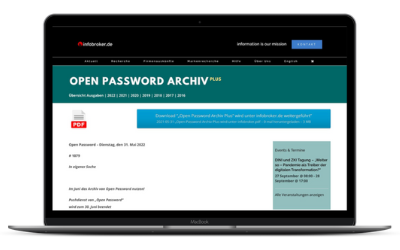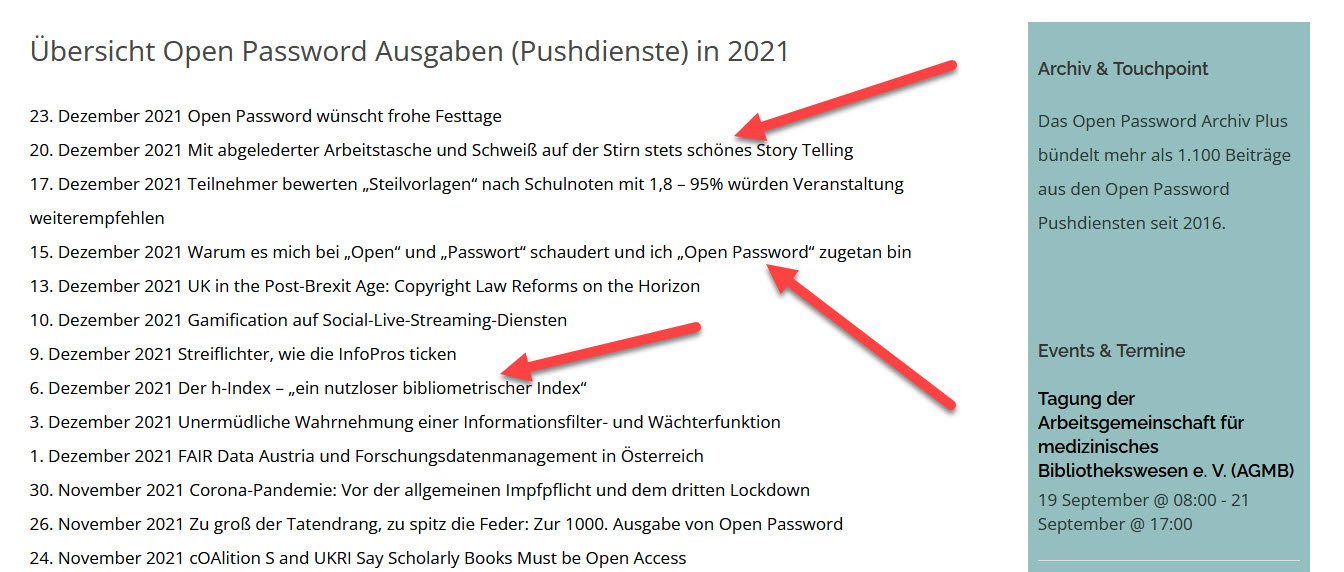Open Password – Montag, den 22. Februar 2021
# 889
ISI 2021 – Information Behavior – Information Literacy – Information Infrastructure – Programmkommittee – Classification & Evaluation – Hochschulverband Informationswissenschaft – Digital Humanities – Information Retrieval – Information Needs & Search – Knowledge Representation – Emerging Technologies
Zoom – Talent – Transformation – Trust – Business Leaders – Eric Young – Challenges – Agile and Lasting Organizations – Radical Flexibility – Hybrid Workforce – Boston Consulting Group – Workspaces – Pandemic-era Selling Models – Digital Platforms – Culture of Trust – Security & Privacy – Video Communications
International Symposium on Information Science
(ISI 2021)
From Information Behavior & Information Literacy to Information Infrastrukture
Internationalisierung und Verjüngung
des Programmkommittees
- März (9 Uhr) – 10 März (19 Uhr), International Symposium on Information Science (ISI 2021) – Virtual Event. Free of Charge. http//isi2021.net. Von der Home Page aus wird man direkt zur Registrierung geleitet.
Auf der Website hieß es noch am 21. Februar: „Currently, we are still working on the symposium´s final programm. The finished programm will be published on https://isi2021.net shortly. … Currently, we are still working on additional events, such as social events, research events and tours. The finished event list, with further information on how to partcipate, will be published on https://isi2021.net shortly“.
Unter „Program“ finden sich Hinweise zu den vorgesehenen Inhalten:
Montag, 8. März: Information Behavior & Information Literacy – Processes of Classification & Evaluation – Doctoral Consortium I und II – Student´s Program – Jahreshauptversammlung des Hochschulverbandes Informationswissenschaft (17 Uhr)
Dienstag, 9. März: Digital Humanities – Information Retrieval – Information Needs & Search – Knowledge Representation – Emerging Technologies – Doctoral Consortium III
Mittwoch, 10. März: Information Infrastruktur – Information Behavior & Infomation Literacy II
Es schließt sich ein Workshop am Donnerstag, 11. März, 9 Uhr, an („Express your Research“).
Im Programmkommittee hat eine Verjüngung und Internationalisierung stattgefunden. Dem Komitee gehören derzeit an:
Tatjana Aprac Jelusic – University of Zadar
Ingo Barkow – FH Graubünden, Chur
Christoph Bläsi – Study of the Book / Johannes Gutenberg University of Mainz
Timo Breuer – TH Köln (University of Applied Science)
Manuel Burghardt – University of Leipzig
Maximilian Eibl – Chemnitz Technical University
David Elsweiler – University of Regensburg
Rebecca Frank – Humboldt-Universität zu Berlin
Norbert Fuhr – University of Duisburg-Essen
Maria Gaede – Humboldt-Universität zu Berlin, Berlin School of Library and Information Science
Ursula Georgy – TH Köln (University of Applied Science)
Bela Gipp – UC Berkeley, California and University of Konstanz/Wuppertal, Germany
Juan Gorraiz – University of Vienna
Michael Granitzer – University of Passau
Joachim Griesbaum – University of Hildesheim
Vicente Pablo, Guerrero-Bote – University of Extremadura
Felix Hamborg – University of Konstanz
Siegfried Handschuh – University of St. Gallen
Gernot Heisenberg – Technical University of Applied Sciences Cologne
Niels Henze – University of Regensburg
Ulrich Herb – Repository Manager, Specialist Electronic Publishing & Open Access
Gerhard Heyer – University of Leipzig
Hans-Christoph Hobohm – FH Potsdam
Isto Huvila – Uppsala University
Yvonne Kammerer – Leibniz-Institut für Wissensmedien, Tübingen
Markus Kattenbeck – TU Wien
Dowan Kim – Pai Chai University, Daejeon, Südkorea
Udo Kruschwitz – University of Regensburg
Rainer Kuhlen – Universität Konstanz
Dirk Lewandowski – HAW Hamburg
Bernd Ludwig – University Regensburg
Thomas Mandl – University of Hildesheim
Zinaida Manžuch – Vilnius University
Philipp Mayr – GESIS – Leibniz Institut für Sozialwissenschaften
Florian Meier – Aalborg University, Copenhagen
Norman Meuschke – University of Wuppertal
Antje Michel – FH Potsdam
Heike Neuroth – University of Applied Sciences Potsdam
Achim Osswald – Cologne University of Applied Sciences
Franjo Pehar – University of Zadar, Department of Information Sciences
Isabella Peters – ZBW, Kiel
Vivien Petras – Humboldt-Universität zu Berlin
Wolf Rauch – University of Graz
Gerhard Reichmann – Uni Graz
Ulrich Reimer – Eastern Switzerland University of Applied Sciences
Juergen Reischer – Information Science @ University of Regensburg
Philipp Schaer – TH Köln (University of Applied Sciences)
Thomas Schmidt – Universität Regensburg
Jasmin Schmitz – ZB MED – Information Centre for Life Sciences
Stefan,Schmunk – University of Applied Sciences, Darmstadt
Melanie Siegel – Hochschule Darmstadt
Elisabeth Staudegger – Universität Graz
Julia Maria Struß – University of Applied Sciences Potsdam
Gabriela Tullius – Reutlingen University
Dirk Tunger – Forschungszentrum Jülich, Central Library
Sirje Virkus – Tallinn University
Albert Weichselbraun – University of Applied Sciences of the Grisons
Raphael Wimmer – University of Regensburg
Christian Wolff – Media Computing, Regensburg University
Christa Womser-Hacker – University of Hildesheim
Maja Žumer – University of Ljubljana
Zoom:
Password Onlines
Unternehmen des Jahres 2021/2020
(Zweiter Teil)
Talent, Transformation and Trust
– the critical factors to future success
and how business leaders can begin
taking action now
By Eric Young, Founder und CEO of Zoom
Eric Young
One of the things I love most about my work is the time I spend with customers and colleagues talking about the challenges they face, and what it takes to build innovative, sustainable, lasting organizations. For many, navigating the challenges presented by the pandemic has thrown what’s most important into stark relief.
The same three themes come up again and again: talent, transformation, and trust. I am more convinced than ever that these are the most essential needs for building forward with confidence.
Organizations that…
- empower talent to be productive from anywhere
- reimagine legacy processes as transformed services
- provide the secure, safe, and private means to collaborate with confidence
… will create environments in which we can do our best work.
From pioneering tech startups to multinational banks, from the most innovative educators to healthcare leaders, these pillars are essential to building agile, lasting organizations. C-level executives embracing these guideposts will help support their teams in the work they are doing to build forward.
Here is why we believe talent, transformation, and trust to be so critical to future success and how business leaders can begin taking action now.
__________________________________________________________________________________
Talent: Recruit, onboard, retain & enable top talent
__________________________________________________________________________________
People are core to business success, and leaders will support employees by embracing the concept of radical flexibility. They will build organizations around a hybrid workforce that is empowered to decide where, when, and how they work – and that is evaluated by the results they deliver.
Organizations that fail to nurture a perpetual hybrid model are at risk of losing top talent essential for building a resilient business. In a Boston Consulting Group survey of 12,000 professionals, 60% said that they want flexibility in where and when they work.
The work of supporting talent also extends to the physical realm. As hybrid teams return to the office, workspace needs will be different. Flexible strategies like hot desking, where employees don’t have an assigned workstation, might be more cost-effective as teams stagger in-office schedules and as your workplace teams navigate food, safety, and long-term space considerations. At the same time, employees will need interactive spaces designed for group work and deep thinking.
We need to be prepared to support all of these constructs, which are simultaneously flexible and highly customized, to enable the modern workforce.
__________________________________________________________________________________
Transformation: Serve customers with preferred go-to-market
and modern service offerings
__________________________________________________________________________________
During the past year, we’ve all had to transform the processes for how we sell, how we deliver services, and how we develop our workforce. Customers are saying that they like what they see, and it is clear that expectations for how they buy and how they consume services is changing for the long term.
For example, going forward, IT leaders will partner with the sales organization to support continuing pandemic-era selling models that are based largely on digital platforms, and align with product teams to aid in transforming existing processes into modern service delivery. This will be the blueprint for organizations to offer modern, multi-modal services, and Zoom is here to support that.
__________________________________________________________________________________
Trust: Ensure consistent security, safety, and individual privacy
__________________________________________________________________________________
No vision for a sustainable organization can be realized without creating a culture of trust. Our workforce and customers are in constant motion – working across apps, devices, locations. The solutions we pick need to be able to flex to support them wherever they are, while providing constant levels of security and privacy without getting in the way of productivity.
The conversation today is about digital and physical safety and personal privacy for our workforce and our customers. When we know that we are engaged in an environment that is physically safe and digitally secure wherever we are – and are confident that our privacy is protected – we can do our best work.
__________________________________________________________________________________
Building forward
__________________________________________________________________________________
These pillars should guide how we plan for the future, build our products, and serve our customers and workforce. And when I think about the role of video communications in this context, I believe they’ll provide the foundation to empower people to accomplish great things.
In coming weeks, we’ll dive deeper into what each of these pillars will mean to the modern organization and how talent, transformation, and trust will drive the future of business.
Open Password
Forum und Nachrichten
für die Informationsbranche
im deutschsprachigen Raum
Neue Ausgaben von Open Password erscheinen viermal in der Woche.
Wer den E-Mai-Service kostenfrei abonnieren möchte – bitte unter www.password-online.de eintragen.
Die aktuelle Ausgabe von Open Password ist unmittelbar nach ihrem Erscheinen im Web abzurufen. www.password-online.de/archiv. Das gilt auch für alle früher erschienenen Ausgaben.
International Co-operation Partner:
Outsell (London)
Business Industry Information Association/BIIA (Hongkong)
Anzeige

FAQ + Hilfe



